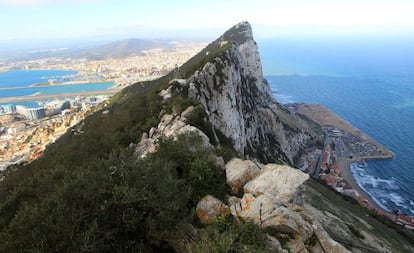Gibraltar “satisfied” with tax treaty that could remove it from Spain’s blacklist
But business and union leaders are unsure if deal will go ahead due to instability of UK and Spanish governments

Gibraltar’s Chief Minister Fabian Picardo has expressed “satisfaction” at an agreement that could take “The Rock” out of Spain’s blacklist of tax havens. But business leaders and unionists are being cautious about a deal that could “become poisoned” due to the instability of the UK government and the uncertain outcome of the upcoming elections in Spain.
The international tax treaty was signed on Monday by Spain’s Foreign Minister Josep Borrell and by the UK’s Cabinet Office minister David Lidington, and must now be ratified by the parliaments of both countries.
This is the first international treaty between Spain and the UK over Gibraltar since the Treaty of Utrecht
Foreign Minister Josep Borrell
The agreement seeks to improve cooperation on tax matters, help resolve disputes over tax residency, and increase transparency and cooperation against tax fraud.
It is the latest in a series of deals between Spain and the UK over longstanding “irritants” involving the British Overseas Territory, such as environmental protection, tobacco smuggling, police cooperation, citizens’ rights and tax matters. In November of last year, London and Madrid signed four memorandums of understanding on matters such as tobacco pricing.
“I trust we will now be able to end the irritating myth that Gibraltar is anything other than entirely cooperative when it comes to the exchange of tax information,” said Chief Minister Fabian Picardo about the latest agreement.

Picardo said he believes that much of the treaty’s content was already being implemented, but that it is a good thing to tie up loose ends and allow Spain “to remove Gibraltar from the Spanish blacklist of tax haven jurisdictions in the future.”
This commitment by Spain is not binding, according to sources at the Foreign Ministry who talked to EL PAÍS. If it materializes, Spanish cross-border workers will not have to deal with dual taxation. It would also represent “one more step toward normalizing trade relations between companies in Spain and Gibraltar,” said sources close to the Gibraltar government.
Minister Borrell said on Monday that the agreement is “the first international treaty between Spain and the UK over Gibraltar since the [1713] Treaty of Utrecht.”
I trust we will now be able to end the irritating myth that Gibraltar is anything other than entirely cooperative when it comes to the exchange of tax information
Gibraltar Chief Minister Fabian Picardo
But not everyone in Gibraltar is quite as optimistic. Except for the changes to workers’ tax obligations, most of the measures contained in the treaty are little more than political grandstanding, said Loren Periáñez, a businessman from the neighboring Spanish city of La Línea de la Concepción and vice-president of the Cross Frontier Group, which represents business associations and unions from Gibraltar and the surrounding Campo de Gibraltar.
“There was already transparency. In any case, anything designed to combat fraud and improve transparency is welcome,” he said. The group’s president, Lionel Chipolina, who is also a representative of Gibraltar’s Unite union, was if anything more cautious: “The agreement eliminates uncertainty, and it seems like the spirit of cooperation is still there. The fear is that it could become poisoned at any given moment.”
Chipolina was expressing doubts as to what Spain’s Gibraltar policy would be if the conservative Popular Party (PP) were to win the general election on April 28. At a political rally in the southern city of Algeciras in November, PP leader Pablo Casado renewed historical claims of Spanish sovereignty over The Rock, which was ceded to Britain under the Treaty of Utrecht in 1713.
English version by Susana Urra.
Tu suscripción se está usando en otro dispositivo
¿Quieres añadir otro usuario a tu suscripción?
Si continúas leyendo en este dispositivo, no se podrá leer en el otro.
FlechaTu suscripción se está usando en otro dispositivo y solo puedes acceder a EL PAÍS desde un dispositivo a la vez.
Si quieres compartir tu cuenta, cambia tu suscripción a la modalidad Premium, así podrás añadir otro usuario. Cada uno accederá con su propia cuenta de email, lo que os permitirá personalizar vuestra experiencia en EL PAÍS.
¿Tienes una suscripción de empresa? Accede aquí para contratar más cuentas.
En el caso de no saber quién está usando tu cuenta, te recomendamos cambiar tu contraseña aquí.
Si decides continuar compartiendo tu cuenta, este mensaje se mostrará en tu dispositivo y en el de la otra persona que está usando tu cuenta de forma indefinida, afectando a tu experiencia de lectura. Puedes consultar aquí los términos y condiciones de la suscripción digital.








































